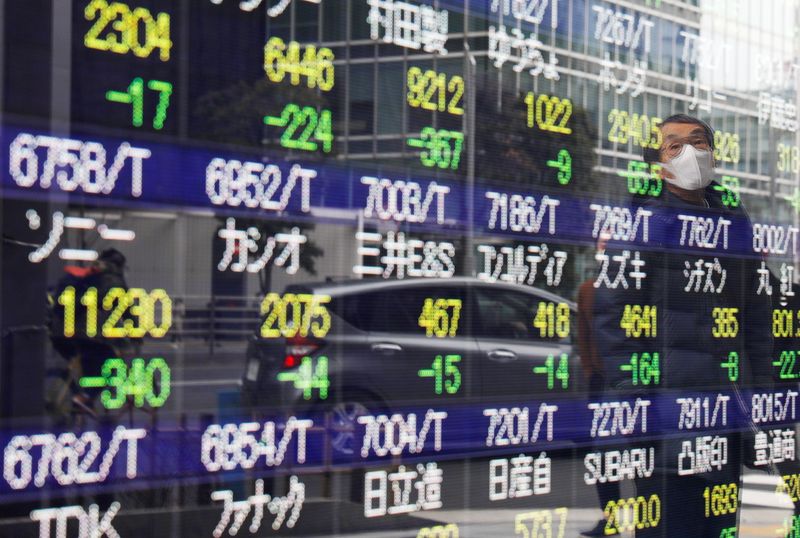By Tom Arnold and Stanley White
LONDON/TOKYO (Reuters) - Global equities languished close to two-week lows on Thursday, while the dollar cruised to near a four-month high against the euro as nervy investors worried that Europe's COVID-19 response was falling behind that in the United States.
European markets opened lower, with the STOXX index of 600 European shares down 0.1% in early trade following a U.S selloff overnight and not helped by data showing the biggest rise since Jan. 9 in new confirmed coronavirus cases in Germany. The number of people with COVID-19 in French intensive care meanwhile set a high for 2021.
Extended lockdowns and worries about the pace of vaccinations across Europe hobbled the euro, which was down 0.1% against the dollar, at $1.1807.
The dollar index had hit its highest since November 2020 overnight, at 92.697, breaking its 200-day moving average.
"The dollar is absolutely critical," said James Athey, investment director at Aberdeen Standard Investments.
"While the 'reflation trade' has been largely driven by U.S. fiscal stimulus and thus growth and inflation expectations, it has also been driven by rising input prices coming from higher commodity prices.
"If the dollar starts rallying that becomes a problem. It means commodity weakness and emerging market weakness and it starts to provide a disinflationary countervailing narrative."
MSCI's gauge of world stocks was 0.03% lower, down for a second day and close to its lowest level in more than two weeks.
Its broadest index of Asia-Pacific shares outside Japan fell 0.2%, bringing it closer to wiping out all the gains it has posted so far this year.
Weighing on sentiment was a selloff in Chinese technology shares due to concerns they will be delisted from U.S. bourses and worries about a semiconductor shortage.
In Hong Kong, companies with U.S. listings led declines. JD.com lost 3.57% and Alibaba (NYSE:BABA) fell 3.91%.
China's blue-chip CSI300 index edged 0.05% lower, to its lowest close since Dec. 11, weighed down by jitters about policy tightening and rising tensions between China and Western countries over allegations of human rights abuses in Xinjiang.
U.S. stock futures pointed to a steadier start on Wall Street after Wednesday's tumble, with E-minis 0.3% firmer.
The U.S. securities regulator is introducing measures that would kick foreign firms off U.S. stock exchanges if they do not comply with U.S. auditing standards, and require them to disclose any government affiliations -- measures widely expected to hit Chinese companies.
As well as concerns about extended economic lockdowns in Europe, disruptions to the distribution of COVID-19 vaccinations and potential U.S. tax hikes also dimmed investor sentiment.
"Rising interest rates, uncertainty of tax policy, concern over inflation all remain top-of-mind for investors. However, none of these themes speak to rising appetite for risk," said Peter Kenny of Kenny's Commentary LLC and Strategic Board Solutions LLC in Denver.
U.S. crude fell 1.6% to $60.22 per barrel, and Brent fell 1.3% to $63.56 a barrel, giving back some gains made the previous day after one of the world's largest container ships ran aground in the Suez Canal, blocking the vital shipping lane.
Benchmark 10-year U.S. Treasury yields rose to 1.6209%, supported by positive data on the U.S. manufacturing sector.
Investors have focused on the 10-year Treasury yield, pondering if there is room for long-term interest rates to run, said David Kelly, chief global strategist at JPMorgan (NYSE:JPM) Asset Management.
"We know that the economy is primed to begin to really accelerate in the second quarter," Kelly said. "But we haven't seen that acceleration yet so that's what we're waiting for."

Germany's 10-year government bond yield was down one basis point to 0.37%.